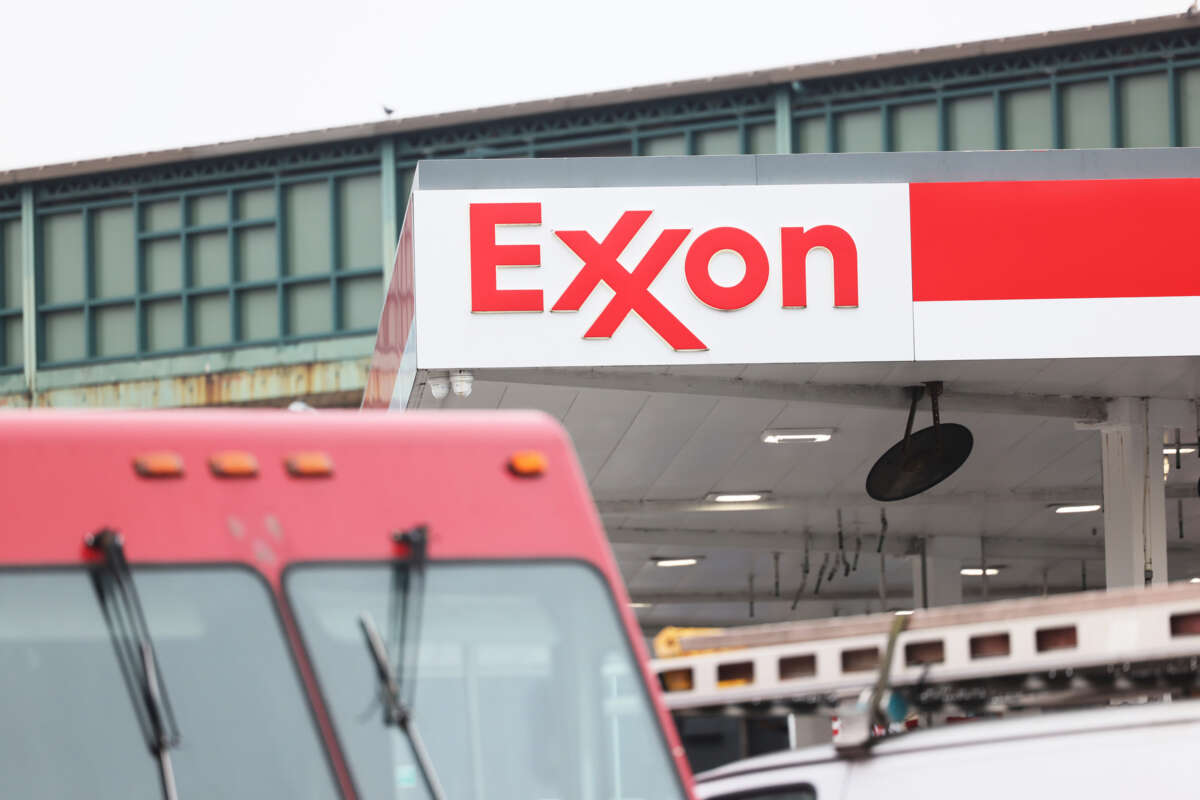Honest, paywall-free news is rare. Please support our boldly independent journalism with a donation of any size.
As the only major U.S. oil company that still hasn’t set emissions-reduction targets for all of their operations and products, an activist shareholder group said Monday that ExxonMobil has likely seen “the writing on the wall” and is making a last-ditch effort to avoid new pollution requirements, leading it to file a lawsuit to stop investors from voting on a climate resolution at its next annual meeting.
Exxon filed a complaint on Sunday in the U.S. District Court for the Northern District of Texas — outside the district where the firm usually files cases — asking a judge to exclude a climate proposal from its proxy statement, which investors will vote on at the company’s annual general meeting (AGM) in May.
The proposal was put forward by Dutch activist shareholder group Follow This, which has introduced motions at other fossil fuel companies’ investor meetings, and investment firm Arjuna Capital. The groups are calling on Exxon to set “Scope 3” emissions targets, which would require the company to reduce emissions produced by those who use its products.
Exxon said last year it plans to reach net zero emissions by 2050, but included only direct emissions from its own infrastructure (Scope 1) and indirect emissions from its operations (Scope 2) in its pledge.
Going to court to stop a similar vote from going forward, said Follow This founder Mark van Baal, is a “remarkable step” by the firm.
“ExxonMobil clearly wants to prevent shareholders using their rights,” said van Baal.
An Exxon spokesperson told The Guardian the company is trying to stop “the breakdown of the shareholder proposal process, one that allows proponents to advance their agendas through a flood of proposals,” and said the proposal requiring Scope 3 emissions targets “does not serve the interests of investors.”
“We are simply asking the court to apply the [Securities and Exchange Commission’s] proxy rules as written to stop this abuse and eliminate the significant resources required to address them,” the spokesperson said.
But as Reuters reported, Follow This — which says it filed its proposal in accordance with SEC rules — has said that investing in a transition to renewable energy sources is in fossil fuel company investors’ best interests, as it would “prevent risks of losing access to capital markets, of facing policy interventions, and incurring in losses associated with stranded assets.”
“ExxonMobil appears to interpret reducing emissions as decreasing business even though fossil fuels can be replaced by renewable energy,” said van Baal. “The resolution leaves the strategy of how to achieve emissions reductions entirely up to the board. ExxonMobil’s interpretation shows a lack of imagination beyond oil and gas.”
Follow This urged Exxon to listen to the growing number of shareholders who “want to tackle the climate crisis.”
“They realize Big Oil has a key role to play, like the 27 institutional investors who recently co-filed a similar climate resolution at Shell alongside Follow This,” said van Baal.
A coalition of investors controlling about 5% of Shell’s shares plan to back a resolution requiring the company to align its Scope 3 targets with the 2015 Paris climate agreement.
Some observers noted that Exxon filed its complaint in the Northern District of Texas, despite the fact that the company is based in the Houston area and the Southern District usually hears its cases.
Exxon’s case will be heard by U.S. District Judge Reed O’Connor, an appointee of Republican former President George W. Bush who has a record of ruling in favor of right-wing causes. He declared the Affordable Care Act unconstitutional in 2018, ruled last year that “ghost guns” are exempt from background checks, and blocked married same-sex couples from exercising their rights under the Family Medical Leave Act.
Exxon sues its shareholders to block a vote on whether it should strengthen its GHG emissions reduction targets. Case was filed outside of the Southern District of TX where it is headquartered. Why? Northern District judge has a "track record." https://t.co/Hz3jzOBJ6u
— kostyack.bsky.social (@Kostyack) January 22, 2024
Van Baal said Exxon likely took the step because it “is afraid of its shareholders.”
“Apparently,” he said, “the board fears shareholders will vote in favor of emissions-reductions targets.”
A terrifying moment. We appeal for your support.
In the last weeks, we have witnessed an authoritarian assault on communities in Minnesota and across the nation.
The need for truthful, grassroots reporting is urgent at this cataclysmic historical moment. Yet, Trump-aligned billionaires and other allies have taken over many legacy media outlets — the culmination of a decades-long campaign to place control of the narrative into the hands of the political right.
We refuse to let Trump’s blatant propaganda machine go unchecked. Untethered to corporate ownership or advertisers, Truthout remains fearless in our reporting and our determination to use journalism as a tool for justice.
But we need your help just to fund our basic expenses. Over 80 percent of Truthout’s funding comes from small individual donations from our community of readers, and over a third of our total budget is supported by recurring monthly donors.
Truthout’s fundraiser ended last night, and we fell just short of our goal. But your support still matters immensely. Whether you can make a small monthly donation or a larger one-time gift, Truthout only works with your help.
